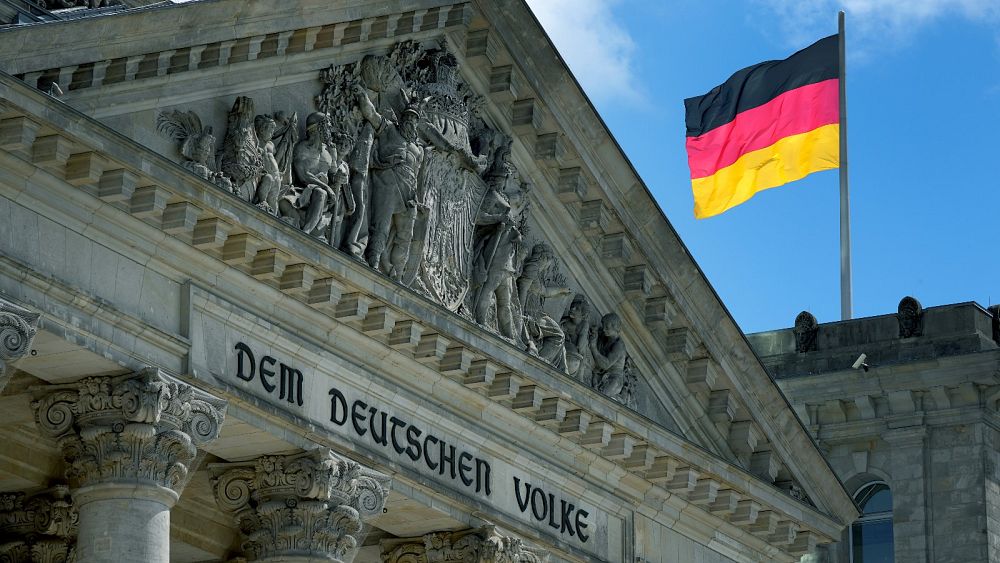
Europe’s economic powerhouse and most populous country will go to the polls on Sunday (September 26) to elect a new government.
Germany’s parliamentary elections are expected to have important implications for the country’s future as Chancellor Angela Merkel steps down after nearly 16 years in power.
Although Germans do not directly elect a new chancellor, they will place two votes to determine the makeup of parliament or the Bundestag, as they do every four years.
Here’s a look at how the German election system works.
How did the election system come to be?
Germany is a federal parliamentary republic and its current system dates back to the end of World War II.
The country’s Basic Law first entered into effect in May 1949 for West Germany. Codified by a council of ministers under pressure from the Allied powers, the Basic Law was meant to be replaced by a constitution.
But when Germany was reunified, the Basic Law endured.
It states that members of the Bundestag should be elected in “general, direct, free, equal, and secret elections” and should represent “the whole people”.
How does voting work?
The Bundestag officially has 598 seats, although that number can fluctuate due to the parliament system. It is the only body that is elected directly by voters.
Every German citizen over the age of 18 is eligible to vote in the elections, resulting in 60.4 million eligible voters: 31.2 million women and 29.2 million men.
Germans place two votes on election day: one for the candidates in their constituency and another for the political party lists.
Half of the Bundestag is made up of candidates from the country’s 299 constituencies.
The vote for those candidates resembles a “first-past-the-post” system, where the person with the most votes wins outright. Each constituency thus sends one winner to the Bundestag.
The rest of parliament comes from the second vote for political party lists. Each party presents a list of candidates in each of Germany’s 16 federal states or Länder.
The number of seats is determined by the population in each Land and then given to parties based on the proportion of the second vote they receive in that Land.
A political party needs at least 5% of the second vote or at least three constituency seats in order to enter the Bundestag. It’s a threshold that is meant to prevent smaller parties from entering parliament and causing political gridlock.
A party’s minimum number of seats is determined by the higher figure between the two votes.
“When it comes to party representation, the second vote is actually more important than the first vote because the second vote defines the percentage of the allocation of seats to the parties,” says Jana Puglierin, head of the European Council on Foreign Relations’ Berlin office.
How is the size of the Bundestag determined?
The Bundestag has 598 seats but its size can fluctuate due to the method of awarding seats to parties.
The second vote determines the proportion of seats a party gets in the Bundestag but a party could receive additional seats if they win more constituency seats in a federal state than they would be entitled to by the second vote.
For example, if one party wins ten seats through the party lists vote, but had 15 candidates directly elected in the constituency vote, it would be given five extra seats in the Bundestag.
The discrepancy occurs because “more and more people distribute their votes differently” between the first and second votes, says Puglierin.
The total number of Bundestag seats is then increased to make sure parties are awarded seats proportional to the second votes.
These “balance seats” are in place to ensure that no party holds an unfair advantage over the others. After the 2017 election, the Bundestag thus had 709 seats instead of 598.
How is the federal chancellor elected?
Political parties often have to negotiate after the elections to form a majority coalition that can lead the government. The chancellor candidates are agreed upon by parties prior to the election.
“After the election, the real work begins because in Germany: German governments are based on a stable governing majority and to build this is the huge task,” says Puglierin.
Then the chancellor is appointed by the federal president and voted on by the Bundestag in a secret vote.
In order to be elected, the federal chancellor must win an absolute majority of votes, known as the chancellor majority.
A second round of voting can be held if the candidate does not secure an absolute majority and if a candidate still does not secure an absolute majority, a third-round will take place in which a candidate must secure a relative majority in order to win.
The federal president then appoints the chancellor within seven days of the election.
This is article is part of our special mini-series to help you understand the German election.
THE ROTTEN FISH: CAN OF WORMS OPENED OF APC & TINUBU'S GOVERNMENT OVER NIGERIA'S ECONOMIC DOWNTURN
WATCH THE CRITICAL ANALYSIS AND KNOW THE RESPONSIBLE PARTIES TO BLAME FOR NIGERIA'S ECONOMIC CHALLENGES, WHILE CITIZENS ENDURE SEVERE HARDSHIPS.Watch this episode of ISSUES IN THE NEWS on 9News Nigeria featuring Peter Obi's Special Adviser, Dr Katch Ononuju, 9News Nigeria Publisher, Obinna Ejianya and Tinubu Support Group Leader, McHezekiah Eherechi
The economic crisis and hardship in Nigeria are parts of the discussion.
Watch, leave your comments, and share to create more awareness on this issue.
#9NewsNigeria #Nigeria #issuesInTheNews #politics #tinubu THE ROTTEN FISH: CAN OF WORMS OPENED ...
DON'T FORGET TO SUBSCRIBE AND LEAVE YOUR COMMENTS FOR SUBSEQUENT UPDATES
#9newsnigeria #economia #economy #nigeria #government @9newsng
www.9newsng.com
